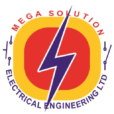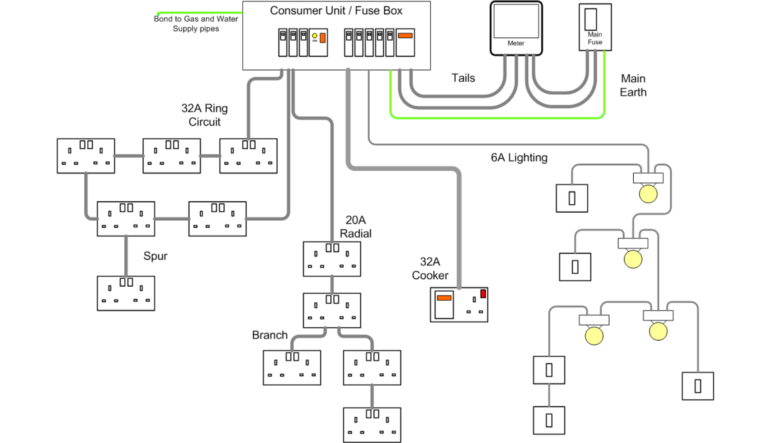Home / Blog Posts / Electrical Wiring In Ghana
Electrical Wiring In Ghana
Electrical wiring in Ghana plays a vital role in powering homes, businesses, and industries. However, it faces unique challenges such as the use of substandard materials, uncertified electricians, and insufficient regulatory enforcement. These issues not only compromise safety but also lead to severe consequences, including electrical shocks, fires, and economic losses.
To address these concerns, the Ghana Electrical Wiring Regulation 2012 (L.I. 2008) provides a framework for standardisation, but enforcement remains a challenge. Implementing regular inspections, imposing penalties for non-compliance, and promoting public awareness are crucial strategies for improvement.
By prioritising safe wiring practices and strengthening industry standards, Ghana can create a safer, more reliable electrical system for its citizens. Stakeholders must collaborate to ensure compliance, uphold ethical practices, and embrace continuous education.
Together, we can build a future where electrical wiring is a cornerstone of safety, efficiency, and progress.
Introduction to Electrical Wiring in Ghana
Electrical wiring forms the backbone of modern infrastructure, powering homes, businesses, and industries. In Ghana, the state of electrical wiring reflects the country’s evolving development, with a mix of traditional practices and modern advancements shaping how electricity is distributed and utilised.
However, there are notable differences between electrical wiring practices in Ghana, the United States, and the United Kingdom. One key difference lies in the wiring colour codes used to identify live, neutral, and earth wires.
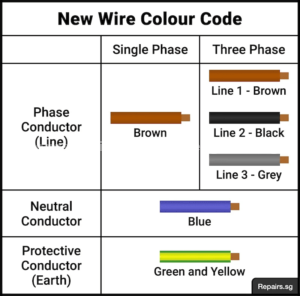 In Ghana and the UK, the standard colour code for wiring includes brown for live, blue for neutral, and green-and-yellow for earth, aligning with British standards. In contrast, the US uses black or red for live, white for neutral, and green or bare copper for earth. Alongside these distinctions, voltage systems vary, with Ghana and the UK utilising 230V for single phase and the US adopting 120V for single phase. These differences highlight the importance of understanding local standards when working with electrical systems.
In Ghana and the UK, the standard colour code for wiring includes brown for live, blue for neutral, and green-and-yellow for earth, aligning with British standards. In contrast, the US uses black or red for live, white for neutral, and green or bare copper for earth. Alongside these distinctions, voltage systems vary, with Ghana and the UK utilising 230V for single phase and the US adopting 120V for single phase. These differences highlight the importance of understanding local standards when working with electrical systems.
This article explores electrical wiring in Ghana and focuses on the challenges, safety risks, regulatory frameworks, and solutions necessary for improvement. It aims to educate and inform homeowners, businesses, electricians, and policymakers about the critical importance of safe and efficient wiring systems.
Common Challenges with Electrical Wiring in Ghana
Electrical wiring in Ghana presents several challenges that threaten safety, efficiency, and reliability. These challenges stem from a mix of systemic issues, insufficient oversight, and inadequate professional standards. Below is an overview of the most prevalent problems:
Uncertified Electricians
The prevalence of uncertified electricians in Ghana significantly undermines the quality of electrical installations in Ghana. These individuals often lack the required skills and knowledge which lead to substandard work that increases the risk of electrical fires and equipment failures.
Use of Substandard Cables and Materials
Even though the Ghana Standard Authority has published “Approved Cable”, The use of poor-quality or counterfeit materials has become widespread issue. Substandard cables and materials have not only reduce the lifespan of electrical systems but also heightened safety risks such as overheating leading to fire outbreaks and electrical shocks.
Wrong Wire or cable Sizing and Inadequate Load Calculation
Improper wire sizing and failure to accurately calculate electrical loads have led to many system overloads, frequent tripping of circuit breakers, and increased fire hazards. This oversight often results in inefficient power distribution and unnecessary energy losses.
Unapproved Wiring and Structures Connected by Power Distributors
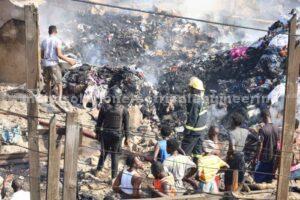 The Distributers sometime install meters on properties with wiring and building structures that do not meet safety or regulatory standards. This practice perpetuates unsafe conditions and makes enforcement of wiring regulations more challenging.
The Distributers sometime install meters on properties with wiring and building structures that do not meet safety or regulatory standards. This practice perpetuates unsafe conditions and makes enforcement of wiring regulations more challenging.
Certified Electricians Cutting Corners
Even certified electricians are sometimes guilty of prioritising profit over quality. They Cut corners, such as skipping crucial electrical safety protocols or using cheaper materials which compromises the integrity of electrical installations.
Lack of Regular Inspections and Maintenance for Electrical Wirings
Sometimes, Electrical wiring systems in Ghana go years without inspection or maintenance. This neglect increases the likelihood of undetected faults, which can escalate into severe issues, including fires or power outages. There are building structures in the Greater Accra and other places of the country with human beings living in them which are over 30 year old with electrical wirings and have never undergone wiring inspections.
Inadequate Training and Education for some Electricians
Even though Energy Commission of Ghana has provided opportunity for Electricians in Ghana to have advance training and education, The lack of advanced training and educational for some electricians hampers the adoption of modern wiring techniques and standards. Many of those electricians rely on outdated practices, making it difficult to improve overall wiring quality.
Corruption and Bribery in the Electrical Industry
Corruption and bribery within the electrical sector further exacerbate these challenges. Some electricians and inspectors accept bribes to overlook safety violations or approve substandard installations, perpetuating a cycle of poor quality.
Safety Risks and Consequences of Poor Electrical Wiring
Poor electrical wiring is not just an inconvenience; it is a severe hazard that can have devastating consequences for individuals, businesses, and communities. Below, we will explore the safety risks and broader implications associated with substandard wiring practices.
Safety Risks
Electrical Shocks and Electrocution
Inadequate wiring, such as exposed wires or improper grounding or earthing, significantly increases the risk of electrical shocks. These incidents can lead to severe injuries or even fatalities to people, particularly in residential areas where children and the elderly are most vulnerable.
Fires and Property Damage
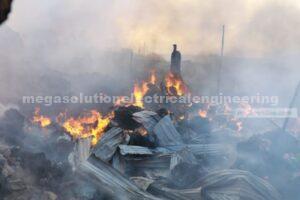 Faulty wiring is a leading cause of electrical fires in Ghana. Overloaded circuits, substandard materials, and improper installations can trigger fires that result in the destruction of homes, businesses and critical infrastructure.
Faulty wiring is a leading cause of electrical fires in Ghana. Overloaded circuits, substandard materials, and improper installations can trigger fires that result in the destruction of homes, businesses and critical infrastructure.
Injuries and Fatalities
Beyond electrocution, other injuries such as burns and fractures may occur during electrical accidents. These incidents often result from improper handling of faulty electrical systems, with fatalities not uncommon in severe cases.
Safety Risks and Consequences of Poor Electrical Wiring
Poor electrical wiring is not just an inconvenience; it is a severe hazard that can have devastating consequences for individuals, businesses, and communities. Below, we explore the safety risks and broader implications associated with substandard wiring practices.
Consequences of Poor Electrical Wiring
Economic Impact on Individuals, Businesses, and the Nation
Electrical fires and equipment damage can lead to significant financial losses. Homeowners face high repair costs, businesses incur expensive downtime, and the nation bears the burden of rebuilding damaged infrastructure.
Loss of Productivity and Revenue
Frequent electrical outages and equipment malfunctions caused by poor wiring disrupt business operations. This leads to reduced productivity, missed deadlines, and loss of revenue, particularly in industries reliant on continuous power supply, such as manufacturing and healthcare.
Damage to Reputation and Trust in the Electrical Industry
Recurring incidents due to poor wiring erode public trust in electricians and the broader electrical industry. Businesses suffer reputational harm when faulty wiring leads to customer dissatisfaction or safety violations.
Regulatory Framework and Standards for Electrical Wiring in Ghana
Ghana has established regulatory measures to ensure electrical wiring is carried out safely and effectively. The Ghana Electrical Wiring Regulation 2012 (L.I. 2008) serves as a cornerstone of these efforts, but enforcement and compliance remain areas of concern. Below is an overview of the regulatory framework, its challenges, and the role of key regulatory bodies.
Overview of the Ghana Electrical Wiring Regulation 2012 (L.I. 2008)
The Ghana Electrical Wiring Regulation, enacted in 2012, aims to ensure the safety and integrity of electrical installations across the country. It mandates that all electrical wiring in residential, commercial, and industrial properties be conducted by certified electricians who adhere to approved standards.
Key features of the Electrical Wiring regulation include:
- Certification of electricians through a rigorous training and assessment process.
- Standardisation of wiring practices to align with international safety norms.
- Mandatory inspections and approvals for all new electrical installations.
This regulation not only protects end-users but also establishes clear guidelines for electricians to deliver quality and compliant services.
Enforcement and Compliance Challenges
Despite the comprehensive nature of L.I. 2008, several challenges hinder its effective implementation:
- Limited Public Awareness: Many homeowners and business owners remain unaware of the regulations, leading to non-compliance.
- Uncertified Electricians: A significant number of electricians operate without certification, often performing substandard work.
- Insufficient Inspection Capacity: Regulatory bodies lack the manpower and resources to conduct thorough and frequent inspections.
- Corruption and Bribery: Instances of bribery compromise enforcement, allowing uncertified electricians to continue operations unchecked.
Role of Regulatory Bodies
The Energy Commission
The Energy Commission is responsible for the certification of electricians and monitoring compliance with L.I. 2008. It conducts training programs and exams to ensure electricians meet the required competency standards.
Ghana Standards Authority (GSA)
The GSA plays a critical role in defining and updating the technical standards for electrical wiring. It collaborates with the Energy Commission to ensure these standards are practical and in line with international best practices.
Electricity Company of Ghana (ECG)
While primarily responsible for power distribution, the ECG ensures meters are connected only to installations approved under the wiring regulations. However, lapses in this process remain a concern.
Implementation and Enforcement Strategies
Ensuring the safety and efficiency of electrical wiring in Ghana requires robust implementation and enforcement of standards. While regulations like the Ghana Electrical Wiring Regulation 2012 (L.I. 2008) set a strong foundation, targeted strategies are essential for effective compliance.
Strategies for Implementing and Enforcing Electrical Wiring Standards
Regular Inspections and Monitoring
- Establish a schedule for periodic inspections of electrical installations across residential, commercial, and industrial properties.
- Deploy trained inspectors to verify compliance with approved wiring standards.
- Use digital platforms to record, track, and evaluate inspection outcomes to ensure transparency.
Penalties and Sanctions for Non-Compliance
- Impose fines or legal penalties on electricians, contractors, or building owners found violating wiring standards.
- Revoke certifications of electricians involved in repeated violations.
- Enforce stricter penalties for corruption within regulatory and enforcement processes.
Incentives and Rewards for Compliance
- Recognise electricians and contractors who consistently comply with wiring standards through awards and certifications.
- Offer tax breaks or discounts on certification renewal fees for businesses that demonstrate compliance.
- Establish a publicly accessible database of certified and compliant electricians for homeowners and businesses.
Public Awareness and Education Campaigns
- Conduct nationwide campaigns to educate homeowners, building owners, and businesses about the importance of safe electrical wiring.
- Partner with schools, community groups, and media outlets to spread awareness.
- Provide resources like brochures, online guides, and videos that highlight wiring safety tips and regulatory requirements.
Roles and Responsibilities for Stakeholders
Government and Regulatory Bodies
- Develop and update wiring standards to reflect advancements in technology and international best practices
- Allocate adequate resources to inspection teams to improve the scope and frequency of monitoring.
- Foster inter-agency collaboration to combat corruption and ensure enforcement integrity.
Electricians and Electrical Contractors
- Complete certification and adhere strictly to the guidelines outlined in L.I. 2008.
- Maintain a commitment to ethical practices, avoiding shortcuts and substandard materials.
- Educate clients on the importance of compliance and safe wiring practices.
Homeowners and Building Owners
- Hire only certified electricians for installations, repairs, and inspections.
- Stay informed about wiring standards and insist on compliance for any work performed on their properties.
- Report suspected violations or unsafe practices to regulatory authorities.
Manufacturers and Suppliers of Electrical Materials
- Ensure all electrical materials meet approved quality standards before distribution.
- Label products clearly with compliance certifications to guide electricians and consumers.
- Collaborate with regulatory bodies to prevent the influx of substandard materials into the market.
Electrical wiring plays a critical role in ensuring the safety, functionality, and growth of Ghana’s residential, commercial, and industrial sectors. Throughout this discussion, we’ve explored the current state of electrical wiring in Ghana, the challenges faced, the safety risks associated with poor practices, and the existing regulatory frameworks. We’ve also highlighted practical strategies to implement and enforce standards effectively.
It is clear that prioritising safe and standardised electrical wiring is not just a technical necessity—it is a societal imperative. Addressing these challenges requires a coordinated effort from all stakeholders, including government bodies, electricians, building owners, and material suppliers.
We urge all stakeholders to make electrical wiring safety a top priority.
- Government and Regulatory Bodies: Strengthen enforcement measures and allocate resources for regular inspections
- Electricians and Contractors: Commit to ethical practices and continuous professional development.
- Homeowners and Building Owners: Insist on certified electricians and regular inspections to ensure compliance.
- Manufacturers and Suppliers: Uphold quality standards and prevent the circulation of substandard materials.
Recommendations
To drive further improvements in Ghana’s electrical wiring landscape:
- Conduct research to explore the integration of advanced technologies, such as smart wiring systems, to enhance safety and efficiency.
- Develop policies that incentivise innovation and compliance within the electrical industry.
- Foster partnerships between academia, industry, and regulatory bodies to ensure that training and standards remain current with global trends.
By taking these proactive steps, Ghana can establish itself as a model for safe, efficient, and innovative electrical systems. Let us work together to ensure a brighter and safer future for everyone.
Contact us today to learn more about our services or to schedule an inspection with our certified electricians.
Always Hire Professionals
No matter urgent any electrical repairs seem, it’s never okay to attempt to handle them on your own. Trying to take care of electrical problems without professional training is extremely dangerous. If you or someone else aren’t hurt during your attempt, there’s still a chance that you’ve left something undone that poses a huge risk to you, your home, or your family. In fact, faulty electrical wiring is the number one cause of house fires in the United States, according to the National Fire Protection Agency. So in order to make sure that your home is safe, always rely on a professional for any electrical services.
Mega Solution Electrical Engineering – Electrical Wiring in Accra – Ghana
Our electrical wiring technicians in Accra – Ghana know what a hassle any electrical wiring problems can be, which is why we’ll always respond to any requests for service as quickly as possible. And because all of our technicians are licensed, background checked, and professionally trained, you’re guaranteed to receive the best quality service and workmanship available when you call us. We can assist with all your electric needs including:
- Generator Installation and Repair Services
- Best Industrial Electrical Automation services
- Best Electric Motor Rewinding Services
- Earthing Installations and Upgrades Services
- Electro-Mechanical services
- Lighting Installation
- Residential Electrical Installation Services
- Electrical Panel Replacement
- LED Lighting
- Industrial electrical Installation Services
- Electrical Troubleshooting and Repairs
- Professional Electrical Support and Training Services
- Electrical Wiring Design and Engineering Services
- Electrical Energy and Power Auditing Services
- Distribution Panels Fabrication and Upgrades Services
- Professional electrical contractors in Ghana
- Commercial electrical Installation Services
- Licensed Electricians in Ghana
- Home Wiring
- Consulting and Advisory services
- Electrical Wirings Testing and Inspection Services
- Wiring Replacement and Upgrade Services
- Residencial, commercial and Industrial wiring Services
Don’t risk electrical hazards or poor workmanship. Contact Mega Solution Electrical Engineering for reliable electrical services in Ghana
Call us at +233 24 415 1232
Search
Electrical Wiring Contract – What Can Go Wrong or Right
Generator Service Experts in Ghana, When the Lights Go Out – Mega Solution Electrical to the Rescue!
Categories
- Certified Electricians Ghana
- Commercial Electrical Services
- Commercial Installation
- Consulting Services
- Contracting Services
- Control Systems
- Distribution Panel Fabrication
- Earthing Installations
- Earthing Maintenance
- Electrical Consulting
- Electrical Contractors
- Electrical Installation Ghana
- Electrical Maintenance Ghana
- Electrical Repair Ghana
- Electrical Safety
- Electrical Services
- Electrical Training
- Energy Auditing
- Engineering Services
- Generator Installation
- Generator Load Testing
- Generator Repair
- Generator Services
- Generator Servicing Ghana
- Ghana Electrical Licensing
- Ghana Electrical Services
- Industrial Electrical Services
- Industrial Installation
- Industrial Services
- Industrial Solutions
- Installation Services
- Licensed Electricians
- Motor Rewinding
- Residencial Installation
- Residential Electrical Service
- Residential Services
- Uncategorized
Archive
| M | T | W | T | F | S | S |
|---|---|---|---|---|---|---|
| 1 | ||||||
| 2 | 3 | 4 | 5 | 6 | 7 | 8 |
| 9 | 10 | 11 | 12 | 13 | 14 | 15 |
| 16 | 17 | 18 | 19 | 20 | 21 | 22 |
| 23 | 24 | 25 | 26 | 27 | 28 | |
Tags
- Commercial Electrical Contracting
- Commercial Electrical Installation Ghana
- Commercial Electrical Repair
- Commercial Electrical Wiring
- Commercial generator maintenance
- Earthing Installations and Upgrades Services
- Electrical
- Electrical Automation Services
- Electrical CAD Design
- Electrical Company
- Electrical Contractors in Ghana
- Electrical Energy and Power Auditing Services
- Electrical Wiring Design and Engineering Services
- Electrical Wiring Design Ghana
- Electrical Wiring Upgrades
- Electricians
- Electricians in Ghana
- Electric Motor Repair
- Electric Motor Rewinding
- Electric Motor Rewinding Services
- Factory Electrical Installation
- Generator experts in Ghana
- Generator installation
- Generator Installation and Repair Services
- Generator Installation Ghana
- Generator Maintenance Contracts
- Generator Repairs
- Generator Repair Services
- Generator Repair Services Ghana
- Generators
- Industrial Electrical Contracting
- Industrial Electrical Installation Ghana
- Industrial Electrical Maintenance
- industrial Electrical Repair
- Industrial Electrical Wiring
- Industrial generator repair services
- Installations
- Licensed Electrical Contractors Ghana
- Licensed Electricians in Ghana
- Residential Electrical Installation Ghana
- Residential Electrical Maintenance
- Residential Electrical Repair
- Residential Electrical Wiring
- Residential standby generator repair
- Wiring Installation Design
Prayer Warfare


